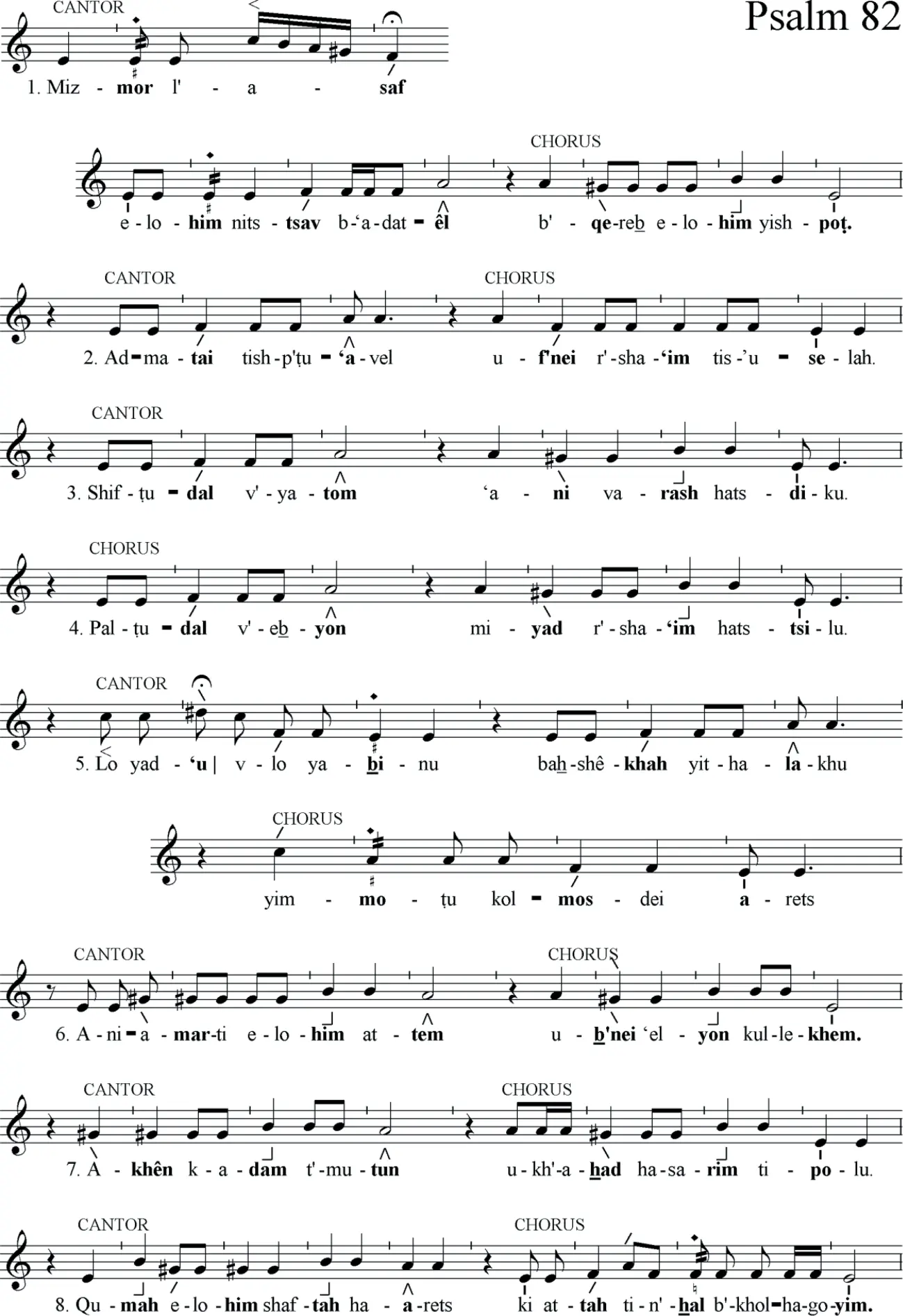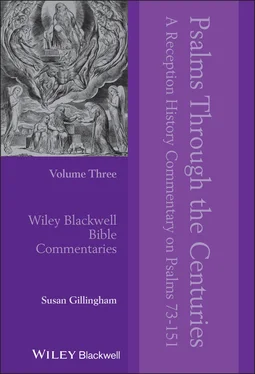It is extraordinary that a psalm with so much drama, both human and divine speeches, and so many possibilities for liturgical responses, should present such little evidence of later musical engagement: perhaps the theological issues referred to above hindered such creativity. The contemporary musicologist David Mitchell’s reconstruction of the psalm in its earliest setting is an original exception. 167The proposed score, offered in Figure 4, is imagined as part of a temple performance, sung by a chorus and an *Asaphite precentor, usually half verse by half verse. The first two verses are an introduction. The term * selah at the end of verse 2 Mitchell reads not as a pause, but as a derivation from the verb ‘lift up’: he argues that the use of selah is therefore to bring in the trumpets and cymbals to announce the theme of the justice of God in the following section. For emphasis, verse 3 is envisaged as sung entirely by the precentor and verse 4 entirely by the choir. The rest of the psalm is an exchange, again in half verses, between the two parts; the finale is in verse 8 (‘Rise up!’) which allows the cantor’s voice to rise from the tonic to the fifth, accompanied, possibly, by the * shofar —with all its associations of military advance, fitting well the subject matter of the verse (O God, judge the earth!’). The performance of the entire psalm reaches a resolution by closing on the tonic, ending (in the Hebrew) with the word ‘nations’. It is of course impossible to know precisely what the psalm sounded like in its original performative setting, but Mitchell has given us fresh insights on the possibilities of Hebrew cantillation, as his score makes clear.

FIGURE 4 Interpretation of singing of Psalm 82 in its earliest setting .
Reproduced with the kind permission of David Mitchell, Director of Music in Holy Trinity Pro-Cathedral, Brussels; website https://brightmorningstar.org/wp-content/uploads/2020/06/Ps-082.pdf
The references to God taking his place ‘in the midst of the gods’ (verse 1) and God’s address ‘you are gods’ (verse 6) have received several different interpretations in art. The image in the *Stuttgart Psalter (fol. 98v) is simply of Christ judging the people; that in the *Utrecht Psalter (fol. 49v) is of the Christ Logos (with six angels) judging groups of men from his place in the heavens: on the left are the poor and needy, walking into the safety of a cave (although their bearing crosses might indicate they are martyrs, ‘children of the Most High’ who will die [verse 6]). To the right is another group and the angels are hurling down idols from pedestals: these are the ‘gods’ whom God has been addressing in verse 1 and who will fall like princes (verse 7). 168
Another motif found in other Psalters is the depiction of the *Harrowing of Hell: the *Khludov Psalter (fol. 82v) offers this. The *Pantokrator Psalter (fol. 114v) uses the psalm for anti-Jewish polemic: it presents an image of the Jews threatening to stone Christ, taken from John 10:33–34 (the text is above the scene). The wickedness of the Jews is portrayed in their menacing and hunched stance. 169
By total contrast, and as a contemporary Jewish example, this psalm was the third of five used by Martin *Buber to address the apparent eclipse of God after the Holocaust and the attendant challenge to Jewish faith. 170Psalm 82 is a psalm of ‘startling cruelty’, revealing God as a hidden ruler allowing injustice to reign on earth. The only resolution is in the last verse, where the psalmist cries to God to judge all the earth (including all inferior gods). ‘The cry… becomes our own cry, which bursts forth from our hearts and rises to our lips in a time of God’s hiddenness’. 171
This is a mysterious psalm which has elicited a wide range of theological responses, particularly about God’s relation to humanity and humanity’s relation to God and to heavenly (angelic?) beings. It is not surprising that it has had such a different reception in Christian and Jewish tradition. The only reading which brings the two traditions together is again one which sees the psalm as essentially about God’s protection of the weak and poor, and about his ultimate judgement on evil.
Psalm 83: An Individual Lament about Ongoing Exile
Psalm 83 looks at the injustice in the world from the viewpoint of the scheming of the nations, and is similar to Psalm 82, which looked at injustice from the perspective of a heavenly council. Just as Ps. 82:7–8 is about the deposition of the gods and their nations, Ps. 83:18 is also about the defeat of foreign nations; both end similarly, that Israel’s God, the ‘Most High’ (82:6 and 83:18) is God of all nations. So, again, we may note the first stage of reception in the placing of similar psalms alongside one another.
This psalm falls into two strophes: verses 1–8, which list nine nations who allegedly join together in a ‘covenant’ against Israel, and verses 9–18, which describe their being scattered throughout the world because of it. The psalm ends, unusually, with naming God as ‘Adonai’, thus anticipating this frequent use of this name in the *Korahite psalms which follow. (In the *Asaphite collection the usual name for God is Elohim.) This psalm is an interesting conclusion to this collection: after all the trauma of defeat and destruction, it envisages all nations coming to acknowledge God’s power. *Targum makes this point clearer by naming the king of Assyria as Sennacherib in verse 9 (Eng. v. 8). Hence the alliance of nine nations in verses 6–12 includes a tenth—namely Assyria, a horrific symbol of hostility—a nation which has been referred to in the reception of several psalms in this collection.
Psalm 83 is used at Passover along with Psalm 135 ( Sop . 18.2). 172This is appropriate in its claims about God’s protection of Israel in the past, and about all nations acknowledging the ‘Most High’ in the future.
In the *Septuagint the translation of verse 3 reads that the enemies no longer conspire against God’s ‘protected ones’ (the noun in Hebrew comes from the verb ṣ-p-n , ‘to shelter’ or ‘hide’) but against God’s ‘holy ones’ ( kata tōn hagiōn sou ). An allusion to the Temple is made more explicit in changing the Hebrew phrase ‘Let us take the pastures of God for our own possession’ to ‘Let us take the holy place of God ( to hagiastērion tou theou ) for our own possession’. 173The attack on the Jerusalem Temple by Antiochus Epiphanes in the second-century BCE may well have a more sacral emphasis in later tradition.
The names of the enemies (verses 5–12) have had an interesting reception in Christian tradition. *Jerome applies these names to schismatics in the church: these are now those ‘in the churches of Christ (who) read of the tents of Edom, and the Ishmaelites, and so on, with all other names’. 174Similarly *Theodoret of Cyrus refers to the enemies as priests, deacons, and leaders of the church, all who are tainted with heresy. 175The argument of *Aquinas, by contrast, is that the enemies are those outside the church: these are the Jews and all other persecutors of the church. 176A sermon on Psalm 83 by *Erasmus (1533) understands the nine ‘enemies’ in the psalm to have even broader scope: his ‘On Restoring the Unity of the Church’ has specific references to the Turkish threat and the effects of the Reformation. 177
Images in art have two main themes. The *Utrecht Psalter (fol. 48v) and the related * Eadwine Psalter (fol. 147r) depict military scenes of God’s victory over pagan forces. By contrast, images in eastern Psalters tend to portray spiritual scenes of martyrdom set alongside images of the crucifixion: this is evident in the *Khludov Psalter (fol.83r), the *Pantokrator Psalter (fol. 115v), the *Barberini Psalter (fol. 143v), the *Bristol Psalter (fol. 139r), * Theodore Psalter (fol. 111r and 111v), and the * Hamilton Psalter (fol. 159r). 178One of the reasons for these latter images may be the use of the psalm, from the eighth-century onwards, in Good Friday liturgies and in burial liturgies such as the Office of the Dead. 179So whilst one tradition rejoices in military victory for the faithful, the other laments the departed.
Читать дальше













